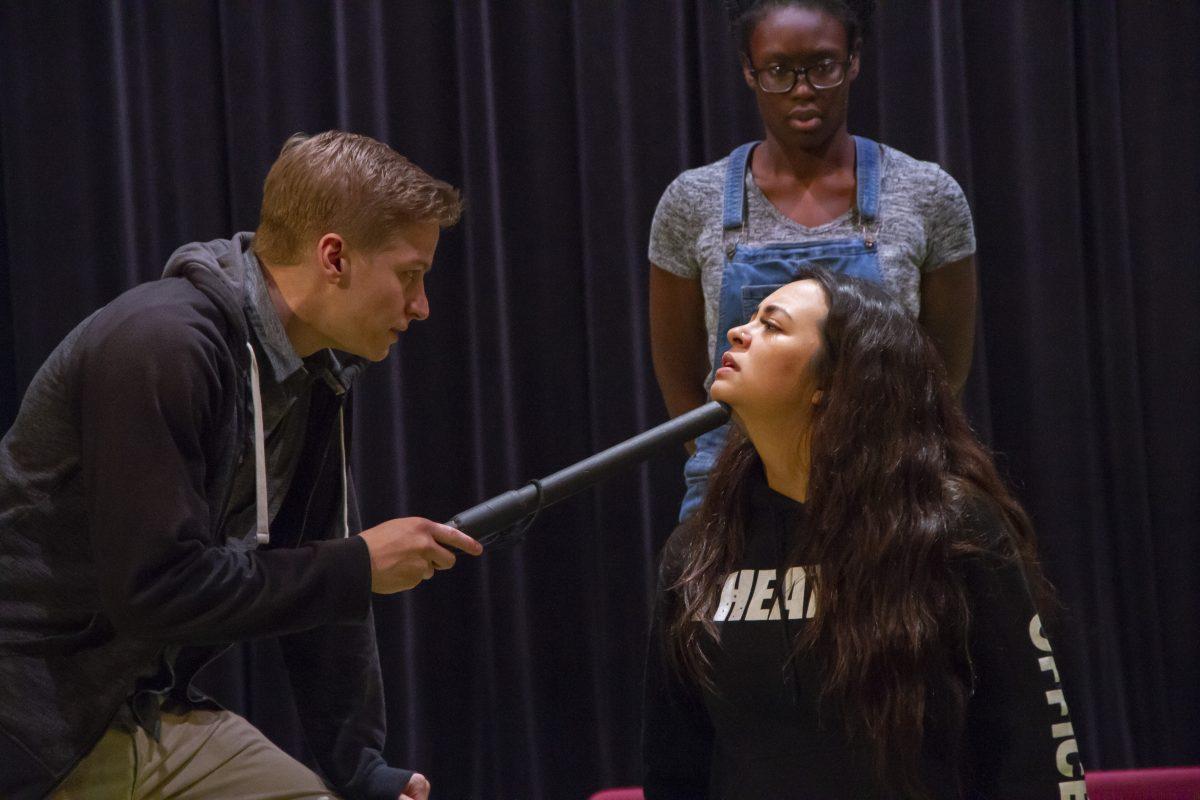To coincide with the upcoming midterm elections, the School of Arts and Humanities will be presenting a production of Shakespeare’s “Julius Caesar” in early November.
The tragedy of Julius Caesar, based on true historical events, is believed to have been written by William Shakespeare around 1599. Director Shelby Allison-Hibbs, a clinical assistant professor of drama, said the message of the play is far from outdated.
“The political era right now is filled with turmoil, and I think this play addresses the idea of fixing a democracy through undemocratic means,” she said. “I think this time we’re in right now, where so many people are angry and frustrated with how our government is functioning, I think that going back and listening to Shakespeare’s take on Julius Caesar is something we should pay attention to.”
Literary studies and theater sophomore Rachel Franko has been acting in theater productions since elementary school. She said she was not expecting to get the lead role of Brutus, as it was her first time auditioning for a Shakespeare production.
“Funnily enough, I went for Portia, thinking I’m going to do a small role (and) it’ll give me time to work on schoolwork this semester,” Franko said. “I’m literary studies, so I’m used to reading Shakespeare, and (the director) was like, ‘Oh, I can tell.’ And she was like, ‘Why don’t you read for Brutus?’ And so I read for Brutus, and here I am.”
The play centers around Brutus, a close friend of Julius Caesar, as he begins to fear that Caesar’s newfound rise to power in Rome could lead to tyranny. Cassius, portrayed by software engineering freshman Zach Neiger, conspires with Brutus to take down Caesar.
“Cassius has his flaws,” Neiger said. “But his greatest flaw is his ego — that he’s so caught up in what he’s trying to do, that he doesn’t realize that the effect of his actions don’t always go as calculated. In the end, he pays for it.”
Actors in the production participate in practices five days a week, averaging a total of 16 hours per week. That estimation is just scheduled practice, said Osinachi Osuagwu, a literary studies senior who plays the role of Julius Caesar.
“Outside the rehearsal process, there’s a lot of time dedicated to memorizing the lines — because (there are) monologues on monologues on monologues — and the language is a bit different from what we’re used to,” Osuagwu said. “And then once it comes to memorizing those lines, then it’s trying to find the meaning and the intent behind those lines — because otherwise, you’re just saying words, and that’s not a line.”
Franko said memorizing 600 lines and playing the role of Brutus led her to a deeper appreciation of the character on an individual level.
“I find his insecurity almost refreshing because I can connect with that in so many ways,” she said. “You have to take Brutus and not only be thoughtful, which is hard to portray onstage without closing yourself off to the audience, but you have to be emotional — you have to be able to get angry but pull yourself back. It tests so many limits of emotion and thought that you have to play in perfect timing and watch yourself that you don’t overdo it.”
The audience will have an opportunity not typically afforded to theater patrons, Allison-Hibbs said.
“I wanted to also play with the idea that the audience is really part of the action,” she said. “We’re bringing 60 audience members onstage, and the show is general admission, so you get to choose wherever you want to sit when you come to the theater. But we’re really pulling the action sort of in a circle onstage. And that’ll give a different effect.”’
Neiger said anybody intimidated by the Shakespeare’s prolific use of language may find that watching the words in action enables an easier understanding of the nuances and meanings.
“Studying the arts is something we all should do — something that everyone should do,” Neiger said. “Theater has played a huge role in my life, and I’m hoping that this performance will bring people to the theater and fill them with the same wonder that theater fills me with.”
Franko said she advises anyone looking to try out acting to put themselves out there because in the end, every single part is integral to a show, and the lifelong friends made through theater are invaluable.
“It is a huge family here,” Franko said. “Everybody cares so much about each other. So, for my life, it’s given me a reason to get out of the house, to get out and do stuff and meet people and — constantly, it’s just reassuring that people care about you.”
There will be six performances of the play in total, starting with the free preview on Nov. 8 at 7 p.m., with following shows at the same time on Nov. 9, 10, 15, 16 and 17. Tickets for shows other than the previews can be purchased online on the Arts and Humanities department event page, and UTD students are eligible for a discounted rate.







